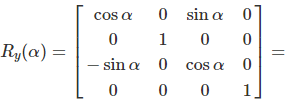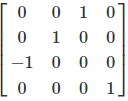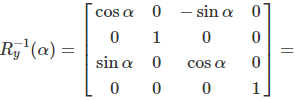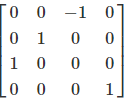Matrix Y-Axis Rotation 4×4
Calculator for rotating around the Y-axis
Y-Axis Rotation Calculator
Instructions
Enter the rotation angle for rotation around the Y-axis. Choose between active (rotate object) or passive (rotate coordinates) rotation.
Y-Axis Rotation - Overview
What is Y-Axis Rotation?
Y-axis rotation (Pitch) rotates points around the Y-axis (vertical axis). The X and Z coordinates change while Y remains constant.
Active Rotation Formula
Counterclockwise rotation (right-hand rule):

Example: 90° Rotation

Key Properties
- Y-coordinate: Remains unchanged
- X and Z: Rotate in XZ-plane
- Active rotation: Counterclockwise (geometric transformation)
- Passive rotation: Clockwise (coordinate system rotation)
- Orthogonal matrix: RT = R-1
|
|
Description of Y-Axis Rotation
Fundamentals
The matrix rotation distinguishes between active and passive rotation. Both are important in different contexts of 3D graphics and engineering.
Active Rotation
With active rotation, the vector or the object is rotated in the coordinate system. The active rotation is also called a geometric transformation. The rotation is counterclockwise.
Example of a 90° rotation around the Y-axis:


Matrix Structure
The Y-axis rotation matrix has a special structure:
- Second row/column: [0, 1, 0, 0] - Y unchanged
- 3×3 submatrix: 2D rotation in XZ-plane
- Last row/column: [0, 0, 0, 1] - Homogeneous coordinate
- Determinant: det(R) = 1 (preserves volume)
- Special property: Sign differs from X and Z rotations
Passive Rotation
With passive rotation, the coordinate system is rotated. The vector remains unchanged. The rotation is clockwise.
Example of a 90° rotation around the Y-axis:


Relationship
Active vs Passive
The passive rotation matrix is the inverse (transpose) of the active rotation matrix:
\(R_y^{passive}(\theta) = R_y^{active}(-\theta) = R_y^{active}(\theta)^T\)
Practical Applications
3D Graphics & Gaming:
- Pitch rotation: Aircraft nose up/down
- Character look: Head tilting up/down
- Camera elevation: Looking up at sky or down at ground
- Turntable rotation: Object presentation
Engineering & Robotics:
- Elevation angle: Crane arm or boom movement
- Pitch control: Ship stabilization
- Coordinate transforms: Between vertical and horizontal planes
- CAD modeling: Side view rotations
Right-Hand Rule for Y-Axis
Active Rotation (Counterclockwise):
- Point your right thumb along the positive Y-axis (upward)
- Curl your fingers naturally
- Your fingers curl from +Z toward +X
- This is the positive rotation direction
Effect on Coordinates:
- Y-coordinate: Always unchanged
- +X axis (1,0,0): Rotates toward -Z
- +Z axis (0,0,1): Rotates toward +X
- 90° rotation: X→-Z, Z→X
Y-Axis Special Properties
Unique Matrix Structure:
- Sign difference: Note the position of the negative sign
- Y-axis rotation: -sin in position (1,3), +sin in (3,1)
- Compare to X-axis: Opposite sign pattern
- XZ-plane rotation: Y remains at [0,1,0,0]
Rotation Plane:
- XZ-plane: Horizontal plane rotation
- Like compass: Turning on a turntable
- Ground plane: Movement in horizontal directions
- Different feel: Than X (pitch) or Z (roll) rotations
Mathematical Properties
Rotation Matrix Properties:
- Orthogonal: RTR = I
- Inverse: R-1 = RT
- Determinant: det(R) = 1
- Preserves length: ||Rv|| = ||v||
- Preserves angles: (Rv)·(Rw) = v·w
Combination Rules:
- Sequential Y-rotations: Ry(θ₂)Ry(θ₁) = Ry(θ₁+θ₂)
- Commutative (same axis): Ry(θ₁)Ry(θ₂) = Ry(θ₂)Ry(θ₁)
- Identity: Ry(0) = I
- Full rotation: Ry(360°) = I
Important Notes
- Y-axis rotations commute: Multiple Y-axis rotations can be combined by simply adding the angles: Ry(30°)·Ry(45°) = Ry(75°)
- NOT commutative with other axes: Ry·Rx ≠ Rx·Ry. The order of rotations around different axes matters!
- Sign convention: The Y-axis rotation has a different sign pattern than X and Z rotations. Pay attention to the position of -sin(θ) in the matrix.
- Gimbal lock context: Y-axis rotation (pitch) at ±90° causes gimbal lock in Euler angle systems. Use quaternions for robust 3D rotations.
Y-Rotation in Euler Angles (Pitch)
The Y-axis rotation is the Pitch component in Euler angles (Roll-Pitch-Yaw):
Pitch (Y-axis):
- Elevation angle
- Nose up/down
- Looking up/down
- Aircraft climb/descend
Characteristics:
- Vertical plane rotation
- Altitude control
- Camera tilt up/down
- Range: typically ±90°
Gimbal Lock Warning:
- Occurs at ±90° pitch
- Two axes align
- Loss of control authority
- Use quaternions instead
Comparison: X, Y, Z Rotations
X-Axis (Roll):
- Rotation in YZ-plane
- Bank angle (tilt left/right)
- X remains constant
- Y and Z change
Y-Axis (Pitch):
- Rotation in XZ-plane
- Elevation angle (nose up/down)
- Y remains constant
- X and Z change
Z-Axis (Yaw):
- Rotation in XY-plane
- Heading angle (turn left/right)
- Z remains constant
- X and Y change
|
|